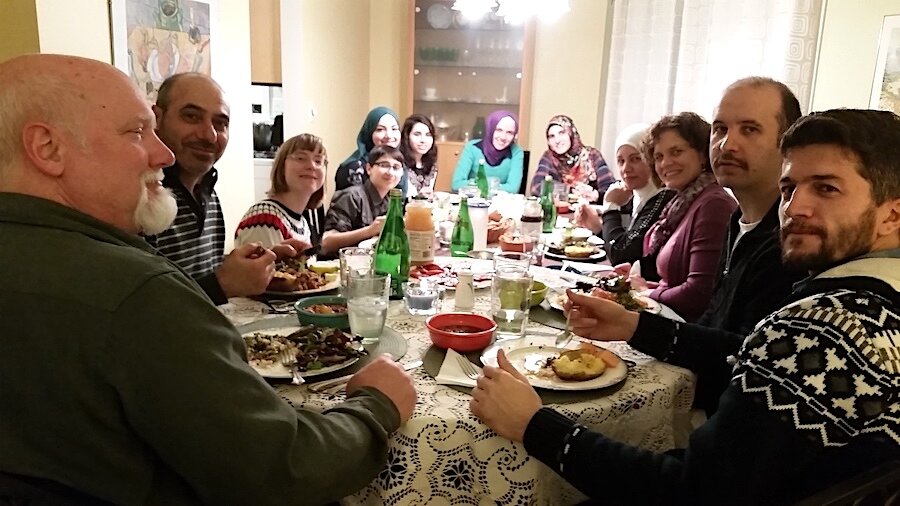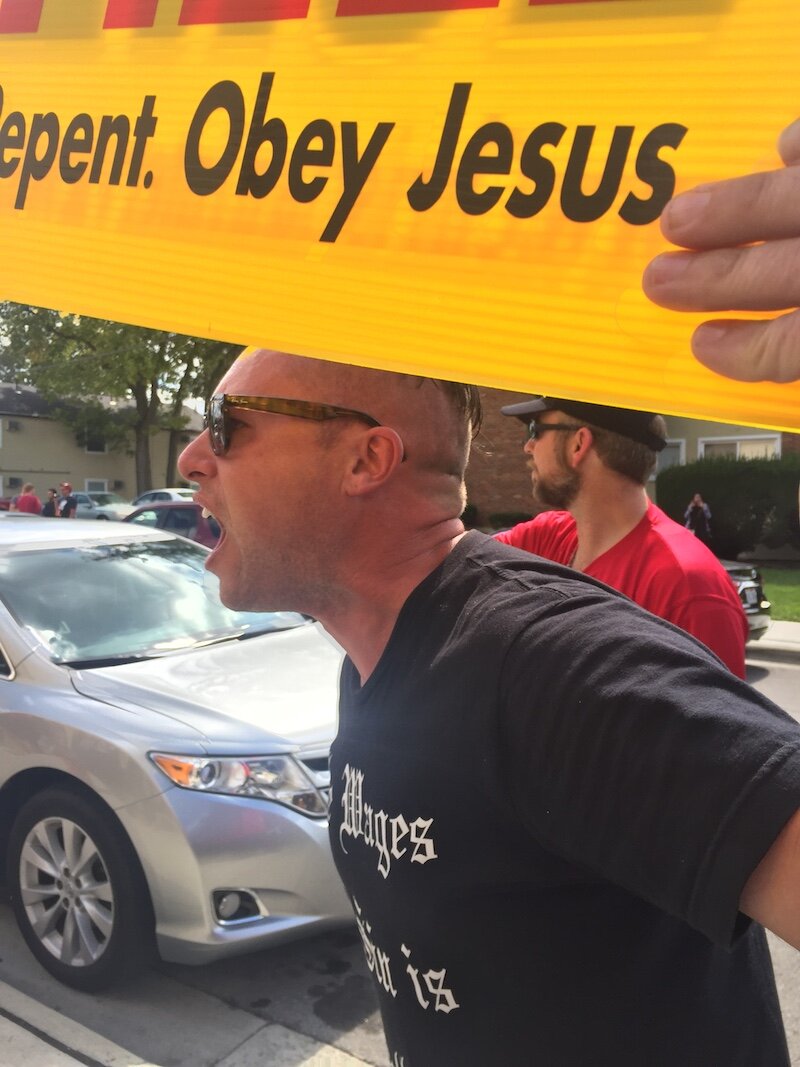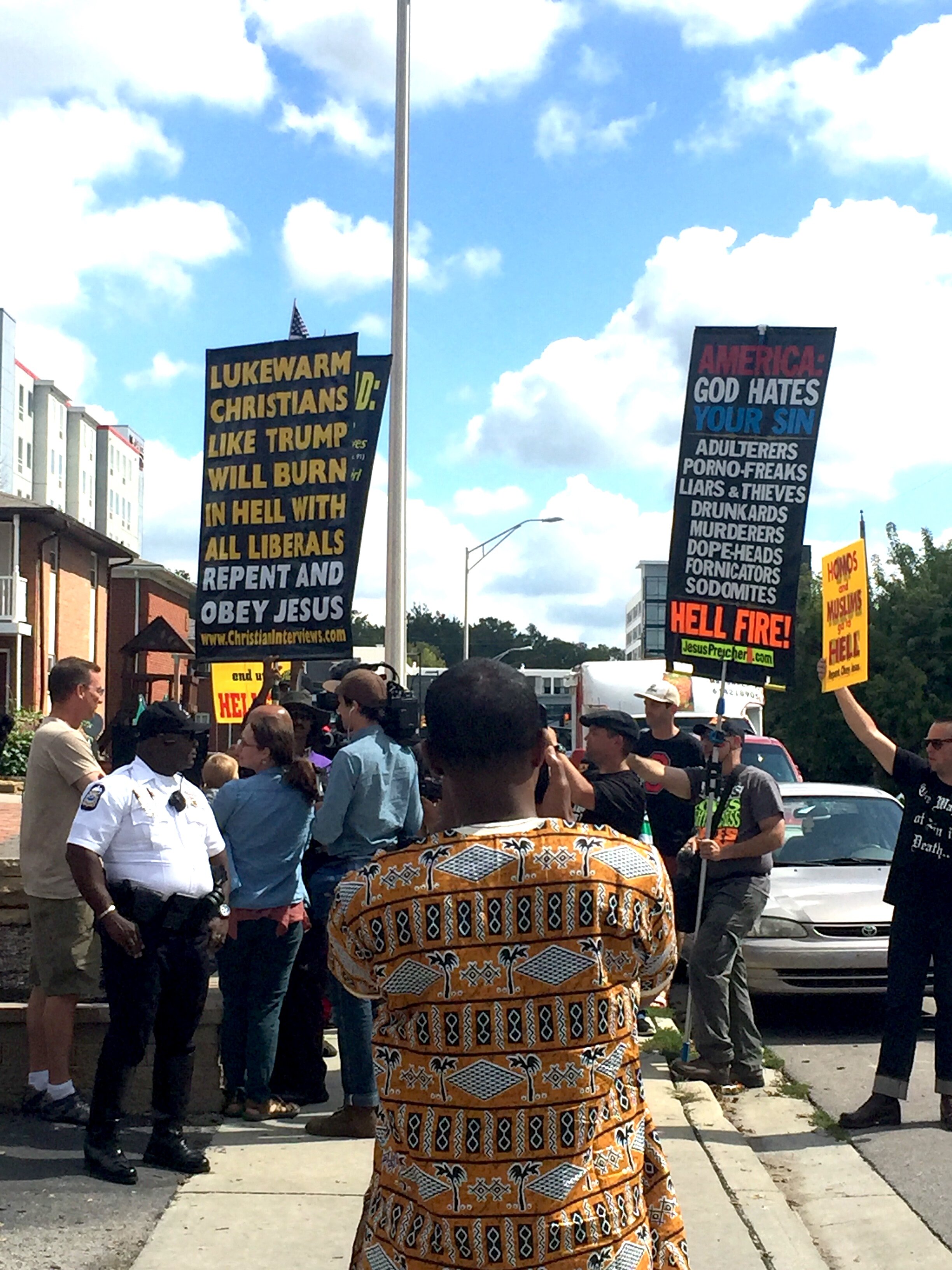What is Love Anyway?
by Rebecca Brown
After berating a nearby man for smoking, the street preacher outside of Masjid Omar Ibn al-Kuttab returned to his anti-Islamic commentary: “Muslims go to hell... You don’t know the words of Jesus. John 14:9!” He shouted with his arms in the air, “Jesus said, ‘If you’ve seen me, you’ve seen the Father!’ Jesus is God! He’s gonna throw you into hell one day, sinner.”
I stood between him and the Muslim youth, using a piece of notebook paper with a scribbled heart on it to block his face as he shouted. “I’m so sorry,” I said to them.
At one point during the 3-hour protest, I was able to have some reasonable conversation with one angry man who was about 40 years old. His shirt said, “Jesus says you must be born again” and he wore a black beret to shield his face from the sun. As I looked into his calm blue eyes I thought, ”He looks so normal.”
Later, describing it to a friend, I said, “If I met him in Starbucks, I wouldn’t know he was any different than me.” He spoke with me, vacillating between a level tone while talking to me and yelling at passersby. “I’ve been doing this since 2010. I know you guys don’t see it this way, but we are loving them… Muslims go to hell! ...It’s tough love... You’re ALL going to hell!”
As I talked with him, something clicked for me: this guy genuinely believes he’s loving people. By calling out their “sins” and defiling the things Muslims hold most dear, he believes he could win some people over to “repentance” and save them from hell. You see, there are many definitions of love. “It’s tough love,” the street preacher said. He was NOT irrational. He just defined love in a way that was harsh, accusatory, and mean… I think the people protesting that day see God as an angry God and therefore the love they brought to the mosque was an angry love.
So can we even know what love really is? Yes.
Jesus. Jesus is our definition of love—the image of the invisible God.
And Jesus’ self-sacrifice on the cross is the epitome of this love.
The way I understand it, the street preacher’s understanding of love has little to do with Jesus-style love. Jesus chose to silently endure abuse, betrayal, and public ridicule and to be murdered on the cross as a demonstration of love for all of us. We are taught, “When you pass judgment on others… you disregard the riches of His kindness, tolerance, and patience, not realizing that God’s kindness leads you to repentance” (Romans 2:3, 4).
We also have a clear set of descriptors for love given to us by one of the early followers of Jesus: “Love is patient, love is kind... It does not dishonor others, it is not self-seeking, it is not easily angered, it keeps no record of wrongs. Love does not delight in evil but rejoices with the truth. It always protects...” I cannot think of a more antithetical list than this when considering the actions of these self-proclaimed Christian street preachers.
Unfortunately, their version of angry love (and angry God) is often associated with Christians. Following the comments on Facebook videos of the event, I saw many messages about the “Christian love” of these men. Some were joking—many were not.
One comment on a media post said, “So why does a religion whose main character is a man of peace and love have followers who are consistently the most violent, hateful, and dismissive people of every human religion in existence?” The reply: “That, my friend, is the million dollar question.” Another commenter on the same thread said, “People like them are why I renounced Christianity and joined the Satanic Temple. The Satanists really are a nicer group of people (no sarcasm intended whatsoever).”
This type of love is a strong force in America’s Evangelicals. While people don’t often come out in front of a Mosque to shout hateful things, plenty of people believe that by labeling, condemning, and publicly slandering (in church or on social media) groups of people, they are somehow being good Christians. They believe that somehow this is “standing up for what you believe in.” These folks think that their actions are justified—just as the street preachers justified their hateful actions. But if Jesus is our standard, these are not justified actions.
Let’s get this straight about love:
We follow Jesus when we love people with gentleness—not aggression.
We follow Jesus when we love people with self-sacrifice, taking the pain of an aggressor onto ourselves.
We follow Jesus when we choose to respond with meekness, even when retaliation would be perfectly justified.
Over and over again, Jesus said, “Follow me.”
Let’s do this by loving everyone—every neighbor, Muslim and street preacher alike.











